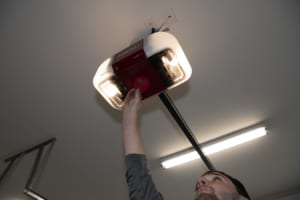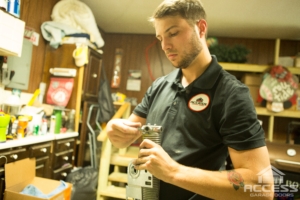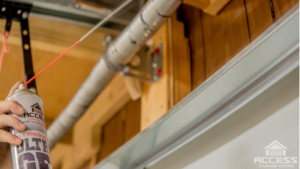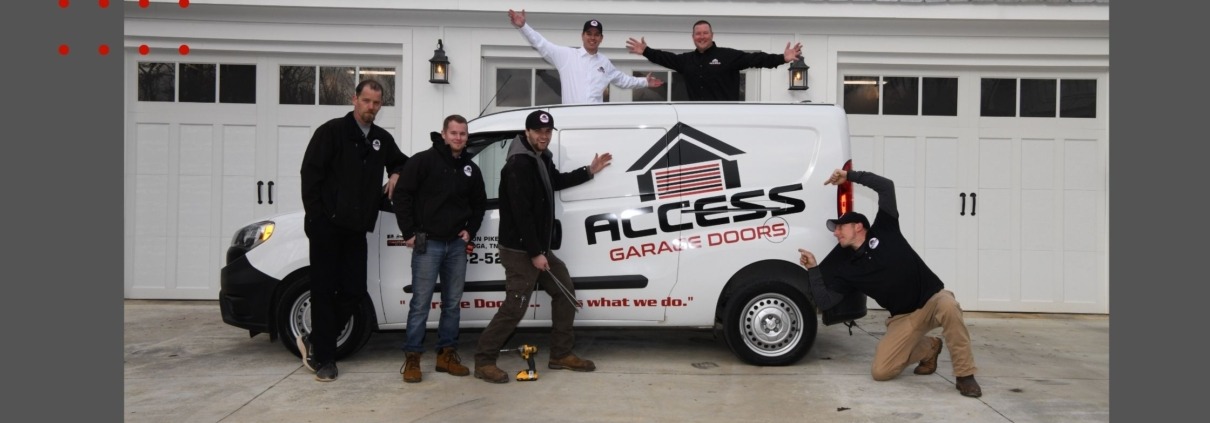Winterizing is a key part of any home’s annual maintenance, but if your garage doors overlooked, the results can be inconvenient and even dangerous. As temperatures plummet during the winter months, without proper garage door maintenance, you or your family could be stuck in your garage, or even worse — stuck outside.
CHECK YOUR GARAGE DOOR OPENER

If your garage door is not working properly and you have an automatic garage door opener and try to open the door manually. If the door opens fine, the issue could be related to your opener. Check the batteries for your opener’s remote, reconnect the opener, and try again.
If the door still doesn’t work, call your local Access Garage Doors, as they can further diagnose issues related to your opener and power supply. Some opener issues may require a trained professional for safety purposes or to maintain any warranties that your opener may have. Always disconnect the opener when the garage door is in the closed position.
GARAGE DOOR WON’T OPEN OR IS VERY DIFFICULT AND HEAVY WHEN TRYING TO LIFT

If your garage door won’t open manually, or it feels like it weighs a ton, you may have a broken spring. This happens more often in the winter/colder months because spring wire becomes more brittle and therefore weakens in colder temperatures.
If you’ve recently opened or closed your door and heard a popping noise, that may have been your spring breaking. If your spring is broken, you may be able to see the long coil above your garage door split into two pieces.
Garage door springs are usually rated for 10,000 cycles, with each cycle being an open and close of the door. If you have lived in your home for 7 years or longer, use your garage door daily, and have never replaced your springs, we recommend having them replaced to avoid being unable to open your door, either being stuck outside or inside your garage.
If you suspect your spring is broken, call your Access Garage Door right away. This repair must be handled by a professional, as attempting to repair this on your own could result in serious injury.
GARAGE DOOR IS FROZEN SHUT
If your garage door is stuck and you see ice or snow around the bottom of the door, your door could be frozen to the concrete. This happens when your bottom weatherseal sits in water or wet snow that eventually freezes when the temperature drops.
To fix a frozen garage door, gently chip away at the ice or use warm water to melt the ice. Raise your garage door, then clean and dry the area to prevent the door from refreezing when you’ve finished.
With a frozen garage door, it is very important to also know what not to do that may damage your door:
Do not try to force your door open and break the ice. This could rip your weatherseal, which will allow water, snow, and cold air into your garage. At that point you’ve simply traded one garage door problem for another more permanent one.
Do not use ice melt on your door, especially if it is a metal door. This can damage the door. Because many homeowners use ice melt during the winter months, if it gets on your door be sure to clean the door as soon as you can. Waxing your door can be a great way to prevent ice melt from sticking to your door.
Do not use “folk remedies” from friends or neighbors before checking with your local Access Garage Doors. Over the years, we’ve heard many recommendations, from the seemingly clever to the downright strange, but what works for one garage door may cause damage to another due to different materials and environments.
GARAGE DOOR OPENS PARTIALLY OR DOESN’T ROLL SMOOTHLY 
If your door opens but doesn’t roll smoothly or gets stuck at a certain spot in the track, it could be a lubricant issue on the rollers or in the track. As the temperature drops, lubricant can harden and get gunky, causing issues when you try to open or close your door.
Applying a grease solvent to the moving parts of your door can remove any hardened lubricant. After this, clean and apply a silicone-based lubricant like Access’s Garage Door Lube to the metal parts of your door.
Do not use WD-40 on your garage door as this lubricant can cause problems for your door in cold weather. Also, do not lubricate your nylon garage door rollers, which are typically black or white.




